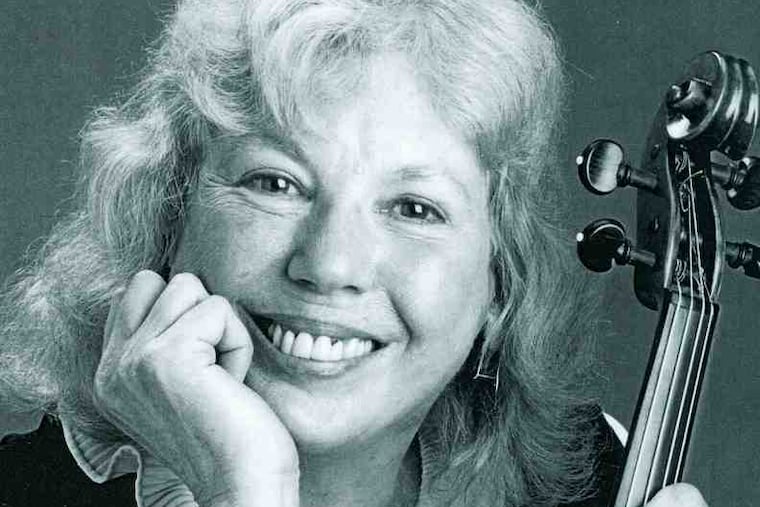Viola technique, talent won national acclaim
Karen Tuttle, 90, a viola virtuoso and teacher who was famous for her coordination technique, died of complications from Alzheimer's disease Thursday, Dec. 16, at her home in Center City.

Karen Tuttle, 90, a viola virtuoso and teacher who was famous for her coordination technique, died of complications from Alzheimer's disease Thursday, Dec. 16, at her home in Center City.
After performing in Philadelphia in 1959, Ms. Tuttle was praised by an Inquirer music critic for "a mellifluous viola tone with technique, intonation, and clarity of phrasing." That year, a Washington Post critic called her playing "eloquent" and added, "She has a solid, alluring tone and seeks music in which the viola can sing."
When Ms. Tuttle debuted at Carnegie Hall before a full house in 1960, New York Times music critic Harold C. Schonberg noted her "large tone, secure intonation, and strong musicianship. She addresses herself passionately to the music. She is a superb instrumentalist with decided ideas."
By then, Ms. Tuttle had been a professional musician for more than 25 years. She had taught at the Curtis Institute of Music for a decade; been hired by Arturo Toscanini for the NBC Orchestra; performed and recorded Haydn with the Schneider Quartet; introduced the viola to audiences in Fiji, Samoa, and Tahiti; and played with Pablo Casals at the Prades Festival in France.
Ms. Tuttle grew up on a farm in Idaho. Her mother, Eunice, was a choir director and her father, Ray, a country fiddler. According to family lore, she and her sister cellist, Laverne, rode horses and held a violin and cello before they could talk or walk, said Ms. Tuttle's daughter, Robin Herskowitz Heald.
In seventh grade, Ms. Tuttle struck a bargain with her mother to let her be schooled at home and to practice four hours a day.
At 14, she had a job playing violin at a funeral home. She acquired a manager and toured the West Coast at 16 and later played musical scores for motion pictures in Hollywood.
Despite her success, she considered quitting because of her physical discomfort while playing.
"I was 17 or 18. At the time I was so totally paralyzed muscularly that I couldn't play," she said in an interview in Strings Magazine in 1998.
Then she saw violist William Primrose play in Los Angeles. "I thought to myself, 'Is it possible for one to play so beautifully and still look so comfortable?' "
Ms. Tuttle asked Primrose if she could study with him. He agreed but said that she would have to move to Philadelphia, where he was teaching at Curtis, and that she would have to play the viola. She agreed.
Eventually, Ms. Tuttle became Primrose's assistant, and when he retired from Curtis, she took over the viola and chamber music department. After leaving Curtis in 1955, she performed solo and with quartets and chamber ensembles. Her teaching included positions at the Peabody Institute in Baltimore and the Manhattan School of Music and several summer positions, including at the Marlboro Music Festival in Vermont.
One of her students introduced her to Morton Herskowitz, a Reichian psychiatrist. In Reichian therapy, the body's well-being is key to psychic well-being, and the therapy uses massage, yoga, and bodywork. Ms. Tuttle, who would marry Herskowitz, espoused the philosophy when she returned to Curtis in the 1980s and joined the faculty of the Juilliard School in New York.
"There are seven points on the body where people lock up, starting with the head and scalp," she told Strings Magazine. She said Primrose, a former boxer, had realized that the concepts that apply to balance in athletics could be applied to playing an instrument.
"My favorite example of a physically balanced athlete is Tiger Woods," she said. "He's just a poem to watch - his follow-through, the way he approaches the ball, everything."
Ms. Tuttle taught her students how to relax their body but also emphasized discipline and concentration. "And after concentration comes creativity, facility, beautiful sound, and getting to your gut feeling or solar plexus," she said. "But none of this works without passion. Passion is love for what you're doing."
In 1994, Ms. Tuttle was recognized with an Artist Teacher Award from the American String Teachers Association. The annual Karen Tuttle Coordination Workshop was established several years ago by a former student, Jeff Irvine.
Ms. Tuttle retired from teaching in 2003 at 83. The next year, Curtis awarded her an honorary doctorate. This year, she was awarded an honorary doctorate from the New England Conservatory of Music.
In addition to her husband of 53 years and daughter, Ms. Tuttle is survived by two grandchildren.
A memorial is planned for June.